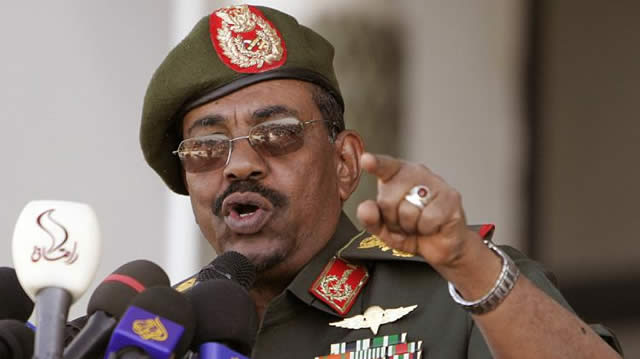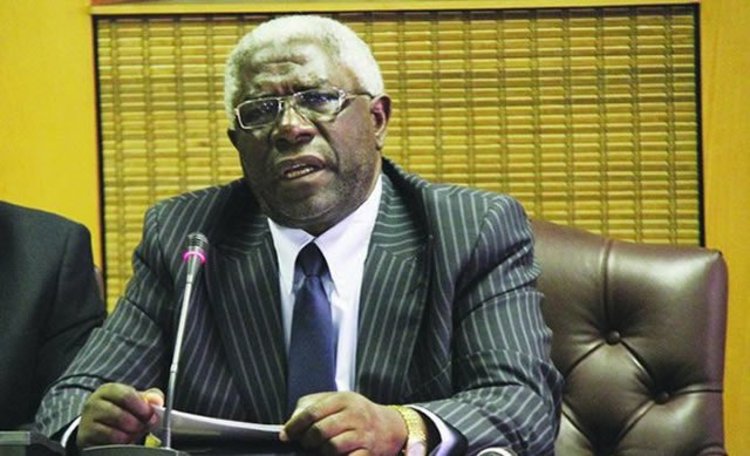BREAKING: Al Bashir arrested

Sudan’s president Omar al-Bashir has been removed from power by the country’s army, following months of protests that escalated at the weekend when demonstrators began a sit-in outside the defence ministry compound in central Khartoum.
In a statement, the Sudanese defence minster and army general Ahmed Awad Ibn Auf said Bashir, who has ruled for 30 years, had been arrested “in a safe place”. A military council will take control of the country for two years, after which elections would be held, the minister added.
“For a long time, examining what’s going on in the state and the corruption that is going on,” the minister said. “The poor are poorer and the rich are still rich and there are no equal chances for the same people.”
The military seized control of state television shortly after dawn on Thursday, amid unconfirmed reports that Bashir was under house arrest at his residence in the defence ministry compound. There were also reports that several senior figures close to Bashir in the ruling National Congress party had been detained.
Khartoum’s airport was also shut and increased deployments of armoured vehicles around the city were reported overnight.
The country, one of Africa’s biggest and most strategically important, has been paralysed by months of protests that erupted on 19 December in the eastern city of Atbara after a government decision to triple the price of bread, but quickly evolved into nationwide demonstrations against Bashir’s rule.
Shortly after dawn on Thursday Sudan state television had trailed “an important announcement”. “The armed forces will present an important statement shortly. Be ready for it,” state television read, without giving further details.
As anticipation built, state television and radio played patriotic music, reminding older Sudanese of how past military takeovers unfolded in the country, and images of recent protests. Protesters outside the defence ministry chanted: “It has fallen, we won.”
Despite a lack of concrete information about what was happening for much of the morning, tens of thousands of Sudanese marched through the centre of Khartoum in jubilation, dancing and chanting anti-Bashir slogans. “People are coming in droves,” said one onlooker. Protesters outside the defence ministry chanted: “It has fallen, we won.”
The Suna state news agency reported that the National Intelligence and Security Service was going to release of all political prisoners, and soldiers were seen raiding the headquarters of the Islamic movement led by Bashir.
Footage posted to social media showed people tearing down posters depicting the president in Khartoum.
Attempts by security forces to break up the Khartoum sit-in have killed at least 22 – including five soldiers, who organisers said were defending the protesters – and injured more than 150.
Some elements within the military had appeared to side with demonstrators against armed militia loyal to Bashir and the feared intelligence services. The army protected demonstrators and opposition leaders called for the military to step in to form a transitional government.
Earlier this week demonstrators were seen hoisting soldiers on their shoulders while others joyfully saluted soldiers in armoured vehicles.
In recent days there have been reports of senior police commanders and militia leaders pledging not to harm the protesters, suggesting support for Bashir’s continued rule was falling away.
“Sudanese always believe that transition should come through the military. All are mindful of what instability could cause. Any chaos could have a very high cost,” said Saif al Din Abdelrahman, a Sudanese economist and expert based in Kenya.
Bashir is a former paratrooper who seized power in a bloodless coup in 1989 and has managed his way through one internal crisis after another while withstanding attempts by the west to weaken him.
The 75-year-old faces genocide charges at the international criminal court relating to extensive human rights abuses perpetrated by Sudanese forces against civilians in Darfur, the western region gripped by conflict since 2003 when rebels took up arms against the government, accusing it of discrimination and neglect. The UN says 300,000 people have died in the conflict and 2.7 million have fled their homes.
However, many other leaders and governments in Africa have defended Bashir.
In October 2017, the US eased sanctions against Sudan, citing improved humanitarian access, the mitigation of conflicts within the country and progress on counter-terrorism. Human rights organisations condemned the move.-The Guardian









Comments